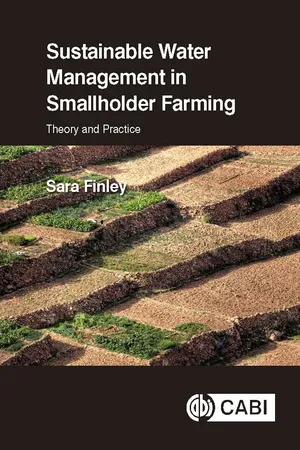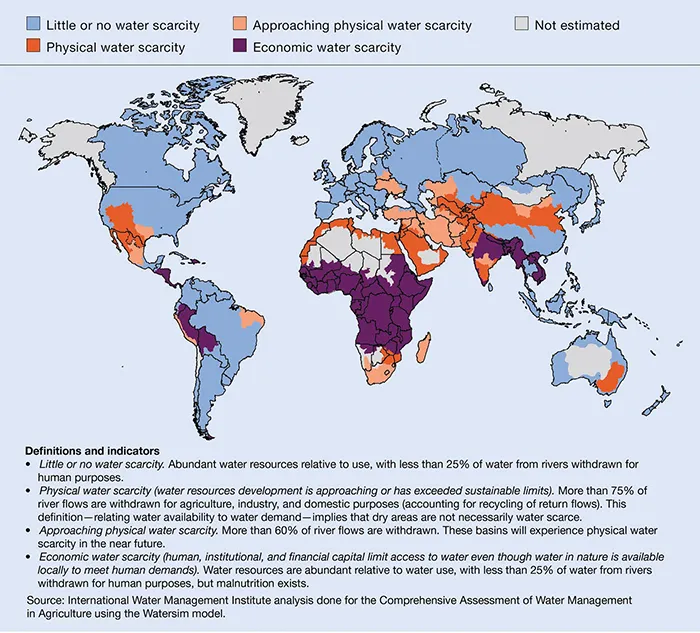![]()
Part 1
Theoretical Foundations of Water Management in Agriculture
| Preamble to Part 1 | 3 |
| Chapter 1: Key Concepts | 7 |
| Chapter 2: Goals of Agricultural Water Management | 17 |
| Chapter 3: Soil and Water | 27 |
| Chapter 4: Plants and Water | 43 |
| Chapter 5: Climate Outlook | 55 |
![]()
Preamble to Part 1
The Scope of this Book
This book provides an introduction to the theoretical foundations of agricultural water management, and presents a range of basic techniques for promoting efficient water use on farms. Subjects covered include crop water requirements, soil and water conservation, rainwater harvesting, conservation agriculture, supplementary irrigation, and more. The book provides a practical, as opposed to an academic, approach; it is hoped that farmers’ groups, extension agents, students and non-governmental organizations (NGOs) can use it as a starting point for continued study. The wide variety of climate and farm types encountered across agricultural areas means that concepts presented are necessarily broad; space limitations prohibit detailed discussions of specific crops, soil types, or climate zones. The information provided here is intended as a generalized practical guide to a suite of techniques that can be adapted according to each farm’s objectives, resources, climate, and crop.
The methods presented in this book are most applicable to agricultural projects that fall into the ‘smallholder’ category – that is, small farms with little or no mechanization. Though some information about partial irrigation is provided, the focus is primarily rainfed farms in climate zones characterized by overall rainfall deficits or frequent dry spells. While water is crucial for all forms of agricultural activity, this publication addresses only the soil-based cultivation of field crops.
The Importance of Water
Water is the lifeblood of the earth, and is vital to the health of humans, animals, plants and soils. Living things depend on water not just for the hydration it provides, but also for the nutrients and minerals that it carries with it. The quantity and quality of water available to a given population is closely tied to the quality of life it enjoys, with direct effects on education, health, economic well-being and personal dignity. Clean water is also fundamental to maintaining the health of natural ecosystems upon which all human activities depend.
In agriculture, water provides the basic elements required for photosynthesis and aids in transporting essential nutrients and minerals from the soil to the plant. Water delivery is a balancing act: the goal is to provide plants with sufficient moisture while ensuring adequate drainage so as not to saturate the soil. Because water can sometimes be difficult to access and its availability can fluctuate over time, effective water management is critical for success in agriculture.
Water and Agriculture: the Global Outlook
International experts agree that we are now entering an era of global water crisis.1 The combined effects of growing demand, declining quality, and a changing climate have exerted a degree of pressure on water supplies that can no longer be sustained without consequence. The result has been a combination of widespread shortages, intensified conflict over access to water supplies, and a rise in occurrence of water-borne illnesses.
Despite global efforts to increase access to this precious resource, water scarcity, where water demand exceeds availability, is widespread and getting worse. Already, the United Nations estimates that 700 million people around the world suffer from water scarcity, and this number is expected to grow rapidly as pollution worsens and limited water supplies come under increased stress.2 By the year 2025, nearly 2 billion people – about one-third of the current world population – are expected to be living in conditions of absolute water scarcity.3 For some, this scarcity is related to physical water shortages in the environment, while for others the scarcity is economic, wherein personal incomes restrict the ability to access water reserves. Figure P1.1 shows the distribution of water-scarce regions in the world as identified in the International Water Management Institute’s (IWMI) 2007 report Water for Food, Water for Life: A Comprehensive Assessment of Water Management in Agriculture.4
Farming is both the cause and a victim of water shortage situations around the world. Globally, agriculture accounts for a full 70% of freshwater withdrawals, and this number reaches over 90% in most developing countries.5 At the same time, there is urgent need to improve the productivity of agriculture, especially in developing nations where the number of hungry and malnourished people is increasing. Because it will be impossible to increase food production without also intensifying agricultural water use, the critical challenge lies in improving water use efficiency on a large scale.6 For these reasons, water management for agriculture is now a central priority for development agencies and policy makers alike.
The first section of this book aims to introduce key concepts involved in water management for agriculture (Chapter 1), identify the general objectives of water management practices (Chapter 2), and provide the theoretical foundation of the relationships between soil and water (Chapter 3), and plants and water (Chapter 4). The last chapter in this section provides an outlook of the trend toward increased climate variability (Chapter 5), a topic that will become more and more relevant to farmers in the context of accelerating global climate change.
References
1 International Business Times, 2015. Catastrophic Global Water Crisis Looming Large, UN Warns. Available at: http://www.ibtimes.com/catastrophic-global-water-crisis-looming-large-un-warns-1854622 [Accessed November 5, 2015].
2 United Nations (UN) Water, International Decade for Action ‘Water for Life’ 2005–2015. Focus Areas: Water Scarcity. un.org. Available at: http://www.un.org/waterforlifedecade/scarcity.shtml [Accessed November 6, 2015].
3 Ibid.
4 Reproduced with permission from Comprehensive Assessment of Water Management in Agriculture, 2007. Water for Food, Water for Life: A Comprehensive Assessment of Water Management in Agriculture. London: Earthscan, and Colombo: International Water Management Institute.
5 United Nations (UN) World Water Assessment Programme, 2014. The United Nations World Water Development Report 2014: Water and Energy. Paris: United Nations Educational, Scientific and Cultural Organization (UNESCO).
6 Comprehensive Assessment of Water Management in Agriculture, 2007. Water for Food, Water for Life: A Comprehensive Assessment of Water Management in Agriculture. London: Earthscan, and Colombo: International Water Management Institute.
![]()
1 Key Concepts
The Water Cycle
Water exists in a variety of forms and on a number of levels in the ecosystem. Surface wat...

